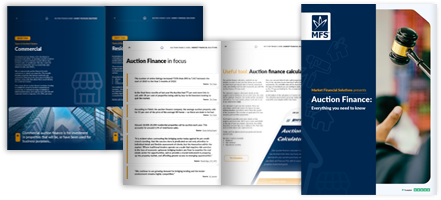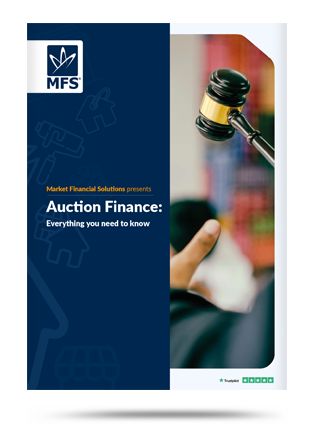Market Financial Solutions are a bridging loan and buy-to-let mortgage provider and are not legal, financial, investment or tax advisers. This document is for informational purposes only and does not, and should not be considered, to constitute legal, financial, investment or tax advice or be relied upon by any person to make a legal, financial, investment or tax decision. Therefore, Investors are encouraged to seek appropriate professional advice. The information in this content is correct at time of writing.

Property auctions are in the spotlight at the moment. Demand is on the rise in the bidding world – as with costs rising, many buyers and investors appear to be turning to the auction world[1] for a solution. In July 2025, over 4,500 lots went to auction, up 3.6% on the prior year, raising £662.4m in the process, an increase of 8.3%[2]. Moreover, nearly 33,500 digital auctions were held in 2024, compared to just shy of 4,000 in-room auctions[3].
But of course, standard property auctions are just one of many options available to bidders. There are many different types of auctions out there, some of which include property, while others do not. There are numerous rules, assets, and features to wrap one’s head around, and it can get confusing very fast.
As such, we’ve rounded up some of the most common aspects auction investors are likely to come across. However, we are not advising anyone to seek out any of these options. Property investors will need to decide what’s right for their portfolios and capital.
1. Residential property auctions
Our market’s bread and butter. Property auctions can take many different forms, some auction houses may only list residential properties, while others only operate in specific regions. Generally, homeowners will turn to an auction house to put their asset(s) up for bidding, usually in the hope that they’ll lock in a quick sale.
There are many reasons why a property would be put up for auction but, this is sometimes done where other selling routes are no longer viable. For instance, it can be difficult to sell a desolated property through an estate agency. But bidders seeking out the chance to fix-and-flip a property often turn to auctions for these kinds of opportunities.
Sellers will usually set a minimum they’ll accept for their properties, and the highest bidder on the day will walk away the winner. Usually, once the gavel drops, the purchase needs to be completed within 28 days.
→ Learn more about how to finance auction properties in our Complete Guide to Auction Finance.
2. Commercial property auctions
Standard commercial property auctions work in the same way as their residential counterparts. But rather than bid on houses or apartments, bidders will instead bid on retail, industrial, or leisure properties[4].
In recent months, residential auctions have proven more popular than commercial auctions. But according to Propertymark, we are starting to see investors move away from the residential auction market to the commercial scene[5].
3. Asset auctions
These types of auctions are for the selling of non-property assets. This commonly includes vehicles, machinery, and even businesses.
Asset auctions can be used by businesses entering insolvency to try sell some of their assets or stock and generate cashflow. Examples can include farming equipment, manufacturing machinery[6], or steel containers.
There are also more general asset auctions where retail goods are sold. Such as furniture, electronics, and clothing.
4. Open and closed auctions
Property, and other types of auctions, can often be categorised into open or closed auctions. When an auction is in the open format, all the bidders present are aware of the bids being submitted. They’ll be able to see what their rivals are bidding, and adapt accordingly.
A closed auction is the opposite. The bidders will not be aware of what others have bid for the asset in question. Sellers in a closed auction may choose to do additional rounds of bidding if they’re not happy with the bids they’ve received.
Both open and closed auctions can be conducted online, or in person.
5. Silent auctions
Silent auctions are similar to closed auctions. The items to be bid on – whether they include jewellery, art, or even holidays – are usually dotted around a room or shown in a list on a tablet. Bid sheets will be available, where buyers will write down their bids, or bidders can log in to bid on items on the provided tablet. At the end of the event, the highest bidders win.
These types of auctions are commonly used by charities and other organisations to raise money for a cause. Sponsors who support the underlying cause may donate the items to be bid on. The money raised will then directly go to the charity or non-profit involved.
6. Modern and traditional auctions
Just as auctions can be open or closed, there is also the traditional auction method, as well as modern auctions. The main difference between the two types of auctions is the length of time available to bidders.
In a traditional auction, buyers usually have 28 days to complete their purchase in full. With the modern auction method, buyers have 56 days[7] to finalise their purchase and arrange finance. Both forms of these auctions can be done online, although modern auctions can only take place in the digital world.
Also, traditional auctions may be more likely to list debilitated properties, whereas modern auctions may attract a broader spectrum of assets. Modern auctions tend to last much longer than traditional auctions.

7. Dutch auctions
Also known as a descending price auction, the bidding process in a traditional Dutch auction works in reverse. The auctioneer typically starts the bidding at a high price, with the idea being that it’s too high a price to pay.
Incrementally, the auctioneer will then lower the price until someone bids. The first person to bid wins. In Dutch auctions, typically, there will be a single bid for each lot, rather than multiple competing bids.
8. Commission bids
Commission bids could turn up in multiple kinds of auction types. In the simplest terms, a commission bid is a bid given to the auctioneer by an individual who cannot attend the sale in person[8].
Auction houses often have several options available to those who can’t make it to the auction. Many will offer telephone bidding and proxy bidding services[9]. Biding by proxy involves registering a best/largest bid with the auctioneer ahead of time, usually via a bidding form.
If one wants to make an offer on a property before an auction actually begins, their best bet is to contact the auction house itself. They’ll be able to let bidders know if this can be accommodated, and how they can go about it.
9. Timed auctions
Timed auctions don’t have an auctioneer guiding the bids at all. Generally, there will be a set bidding window, with the lots involved available for a defined period[10]. As to be expected, the highest bids win. These types of auctions are prevalent online, where you’ll be able to bid on lots 24 hours a day, 7 days a week[11].
10. Blind auctions
In blind bidding[12], the number of winners will typically be determined by the “available quantity” of the assets involved. If there are 10 items up for sale – the top 10 bidders will be the winners. Obviously, in a blind auction, the bidding history is hidden.
If a property investor is bidding in a blind auction, they’ll be told if they have a winning bid. If they don’t, they’ll need to enter a higher bid, or walk away.
11. Call auctions
Call auctions[13] are associated with the equity market. Here, participants will place an order to buy or sell a security at a bid or offered price. These orders are then pulled together and matched at predetermined intervals. This usually all happens via an automated process, although call auction rules can vary by exchange.
12. Conditional auctions
In a conditional auction, a property is offered in a best bids process where the winner secures a period of exclusivity. This period can last several weeks[14].
During this time, the winner will be expected to organise their funding and exchange contracts within a fixed timeframe. Bidders are required to pay a non-refundable reservation fee to secure the exclusivity, with both the seller and the buyer being tied into the process.
The buyer involved will typically be given 28 days to exchange the contracts, and a further 28 days to complete[15].
13. Foreclosure auctions
When UK bidders think out a foreclosure auction, what they’re likely actually after is a repossessed property auction[16]. Repossessed properties are those that have come under the ownership of a bank or mortgage lender. This happens when the original borrower falls into arrears and can no longer cover the repayments.
These properties can then be put up for auction in an attempt to recoup some of the costs. This presents opportunities for buyers.
The properties involved may be listed at a low price to attract bidders. Although, they may need a lot of TLC to increase their value. Repossessed properties may be suitable for those with long term refurbishment plans.
14. Sealed-bid auctions
Here, buyers will submit their offer in a sealed envelope by a specific time and date. At that point, all the envelopes will be opened, and the highest bid will win[17]. Usually, only one bid can be submitted per bidder.
Evidently, there are many different types of auctions and bidding practices out there. Many of which, will not be applicable to a borrower’s circumstances or preferences. But there may also be some types of auctions available that some have even realised were a possibility.
How to finance an auction property
Fortunately, we have a range of specialist finance available that can be tailored to several different scenarios. Chiefly, we have our auction bridging loans, which will allow borrowers to secure residential, commercial, or mixed-use property across England and Wales. These loans can be issued in mere days where needed, allowing property investors to meet the tight deadlines involved. To quickly explore potential costs and options, you can try our Auction Loan Calculator.
We also have a range of products that can help with many business and financial scenarios. Our products can fit in with complex strategies, from raising capital from an existing asset, to conversion projects which require planning permission.
If borrowers would like to explore their options in the auction world, or the wider property investment scene, we’re ready when they are.
The Complete Guide to
Auction Finance
A simple guide to advance your portfolio
- Comprehensive overview
- Auction finance types
- Useful tools
- Industry stats & more
[1] https://propertysoup.co.uk/auction-property-sales-rise-as-investors-turn-to-bridging-finance/
[2] https://theintermediary.co.uk/2025/08/auction-volumes-rise-despite-mixed-commercial-performance-eig/
[3] https://thenegotiator.co.uk/news/auctions-news/digital-property-auctions-now-dwarf-number-of-in-room-gavel-events/
[4] https://www.savills.co.uk/landing-pages/commercial-property-auctions.aspx
[5] https://theintermediary.co.uk/2025/08/auction-volumes-rise-despite-mixed-commercial-performance-eig/
[6] https://www.eddisonsassets.com/assets-for-sale
[7] https://hoa.org.uk/advice/guides-for-homeowners/i-am-selling/modern-method-of-auction/
[8] https://nesbitsauctions.co.uk/commission-bids/
[9] https://www.auctionhouse.co.uk/guide/cant-attend-the-auction
[10] https://support.the-saleroom.com/hc/en-gb/articles/115000058973-What-is-timed-bidding
[11] https://www.sdlauctions.co.uk/property-auctions/timed-auctions/
[12] https://www.charityauctionstoday.com/p/help/what-is-blind-bidding/
[13] https://www.investopedia.com/terms/c/call-auction.asp
[14] https://www.auctionhouse.co.uk/guide/conditional-auction-room
[15] https://www.eigpropertyauctions.co.uk/information/glossary/conditional-auction#:~:text=In%20a%20conditional%20auction%20if,days%20to%20complete%20the%20purchase.
[16] https://www.sdlauctions.co.uk/property-auctions/repossessed-property-auctions-uk/
[17] https://hoa.org.uk/advice/guides-for-homeowners/i-am-buying/sealed-bids/






